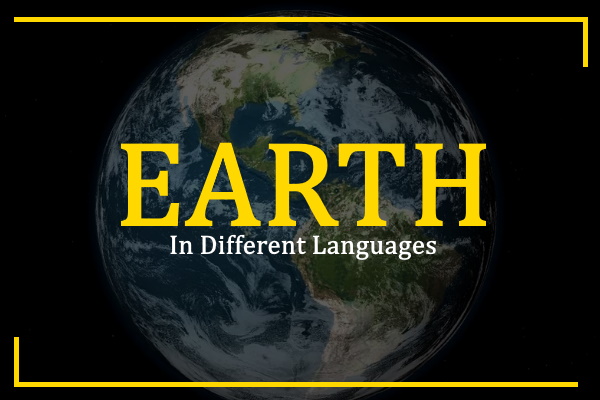Table of Contents
Earth in Different Languages: Earth is a rocky, terrestrial land. It comes on number three from sun and only planet that has life. Earth was formed 4.5 billion years ago. The gravity of Earth interacts in space with many other objects, especially the Sun and the Moon, the only natural satellite on Earth. It is the fifth largest planet. Only earth is the planet that contains free oxygen which is necessary for the survival of life.
Earth in All Languages
Translation of word Earth in almost 100+ different languages of the world.
| Different Languages | Word Earth |
|---|---|
| Albanian | tokë |
| Basque | lurra |
| Belarusian | зямля |
| Bosnian | zemlja |
| Bulgarian | земя |
| Catalan | terra |
| Croatian | Zemlja |
| Czech | Země |
| Danish | jorden |
| Dutch | aarde |
| Estonian | maa |
| Finnish | maa |
| French | Terre |
| Galician | terra |
| German | Erde |
| Greek | γη (gi) |
| Hungarian | föld |
| Icelandic | Jörð |
| Irish | cré |
| Italian | terra |
| Latvian | zeme |
| Lithuanian | žemė |
| Macedonian | земјата |
| Maltese | art |
| Norwegian | jord |
| Polish | Ziemia |
| Portuguese | terra |
| Romanian | Pământ |
| Russian | Земля (zemlya) |
| Serbian | земља (zemlja) |
| Slovak | krajiny |
| Slovenian | zemlja |
| Spanish | tierra |
| Swedish | jord |
| Ukrainian | земля (zemlya) |
| Welsh | ddaear |
| Yiddish | ערד |
| Armenian | երկիր |
| Azerbaijani | yer |
| Bengali | পৃথিবী |
| Chinese Simplified | 地球 (dìqiú) |
| Chinese Traditional | 地球 (dìqiú) |
| Georgian | დედამიწა |
| Gujarati | પૃથ્વી |
| Hindi | पृथ्वी |
| Hmong | lub ntiaj teb |
| Japanese | 地球 |
| Kannada | ಭೂಮಿಯ |
| Kazakh | жер |
| Khmer | ផែនដី |
| Korean | 지구 (jigu) |
| Lao | ແຜ່ນດິນໂລກ |
| Malayalam | ഭൂമി |
| Marathi | पृथ्वी |
| Mongolian | дэлхий |
| Myanmar (Burmese) | မြေကြီးတပြင် |
| Nepali | पृथ्वी |
| Sinhala | පොළොවේ |
| Tajik | замин |
| Tamil | பூமியில் |
| Telugu | భూమి |
| Thai | โลก |
| Turkish | toprak |
| Urdu | زمین |
| Uzbek | yer |
| Vietnamese | trái đất |
| Arabic | رض ('ard) |
| Hebrew | כדור הארץ |
| Persian | زمین |
| Afrikaans | aarde |
| Chichewa | lapansi |
| Hausa | duniya |
| Igbo | ụwa |
| Sesotho | lefatše |
| Somali | dhulka |
| Swahili | dunia |
| Yoruba | aiye |
| Zulu | umhlaba |
| Cebuano | yuta |
| Filipino | lupa |
| Indonesian | bumi |
| Javanese | bumi |
| Malagasy | eto an-tany |
| Malay | bumi |
| Maori | whenua |
| Esperanto | tero |
| Haitian Creole | latè |
| Latin | terra |
Earth in European Languages
Translation of word Earth in almost 42 European languages.
| Different Languages | Word Earth |
|---|---|
| Albanian | tokë |
| Basque | lurra |
| Belarusian | зямля |
| Bosnian | zemlja |
| Bulgarian | земя |
| Catalan | terra |
| Corsican | terra |
| Croatian | Zemlja |
| Czech | Země |
| Danish | jorden |
| Dutch | aarde |
| Estonian | maa |
| Finnish | maa |
| French | Terre |
| Frisian | ierde |
| Galician | terra |
| German | Erde |
| Greek | γη [gi] |
| Hungarian | föld |
| Icelandic | Jörð |
| Irish | cré |
| Italian | terra |
| Latvian | zeme |
| Lithuanian | žemė |
| Luxembourgish | Äerd |
| Macedonian | земјата |
| Maltese | art |
| Norwegian | jord |
| Polish | Ziemia |
| Portuguese | terra |
| Romanian | Pământ |
| Russian | Земля [zemlya] |
| Scots Gaelic | talamh |
| Serbian | земља [zemlja] |
| Slovak | krajiny |
| Slovenian | zemlja |
| Spanish | tierra |
| Swedish | jord |
| Tatar | җир |
| Ukrainian | земля [zemlya] |
| Welsh | ddaear |
| Yiddish | ערד |
Earth in Asian Languages
Translation of word Earth in almost 36 Asian languages.
| Different Languages | Word Earth |
|---|---|
| Armenian | երկիր |
| Azerbaijani | yer |
| Bengali | পৃথিবী |
| Chinese Simplified | 地球 [dìqiú] |
| Chinese Traditional | 地球 [dìqiú] |
| Georgian | დედამიწა |
| Gujarati | પૃથ્વી |
| Hindi | पृथ्वी |
| Hmong | lub ntiaj teb |
| Japanese | 地球 |
| Kannada | ಭೂಮಿಯ |
| Kazakh | жер |
| Khmer | ផែនដី |
| Korean | 지구 [jigu] |
| Kyrgyz | жер |
| Lao | ແຜ່ນດິນໂລກ |
| Malayalam | ഭൂമി |
| Marathi | पृथ्वी |
| Mongolian | дэлхий |
| Myanmar (Burmese) | မြေကြီးတပြင် |
| Nepali | पृथ्वी |
| Odia | ପୃଥିବୀ |
| Pashto | ځمکه |
| Punjabi | ਧਰਤੀ |
| Sindhi | زمين |
| Sinhala | පොළොවේ |
| Tajik | замин |
| Tamil | பூமியில் |
| Telugu | భూమి |
| Thai | โลก |
| Turkish | toprak |
| Turkmen | ýer |
| Urdu | زمین |
| Uyghur | يەر |
| Uzbek | yer |
| Vietnamese | trái đất |
Earth in Middle East Languages
Translation of word Earth in 4 middle eastern languages.
| Different Languages | Word Earth |
|---|---|
| Arabic | أرض ['ard] |
| Hebrew | כדור הארץ |
| Kurdish (Kurmanji) | erd |
| Persian | زمین |
Earth in African Languages
Translation of word Earth in almost 13 African languages.
| Different Languages | Word Earth |
|---|---|
| Afrikaans | aarde |
| Amharic | ምድር |
| Chichewa | lapansi |
| Hausa | duniya |
| Igbo | ụwa |
| Kinyarwanda | isi |
| Sesotho | lefatše |
| Shona | pasi |
| Somali | dhulka |
| Swahili | dunia |
| Xhosa | umhlaba |
| Yoruba | aiye |
| Zulu | umhlaba |
Earth in Austronesian Languages
Translation of word Earth in almost 10 Austronesian languages.
| Different Languages | Word Earth |
|---|---|
| Cebuano | yuta |
| Filipino | lupa |
| Hawaiian | honua |
| Indonesian | bumi |
| Javanese | bumi |
| Malagasy | eto an-tany |
| Malay | bumi |
| Maori | whenua |
| Samoan | lalolagi |
| Sundanese | bumi |
Earth in Other Foreign Languages
| Different Languages | Word Earth |
|---|---|
| Esperanto | tero |
| Haitian Creole | latè |
| Latin | terra |
Video Translation of Earth in 10 Other Languages
Coming Soon…
More Information about Earth
Earth has a diameter of 1300 kilometres. It is a spherical body that pulls matter. 71% of Earth is water most of which is oceans.
Earth rotates on an imaginary line known as an axis extending from the North Pole to the South Pole. This takes the planet 23, 934 hours to spin its axis and 365,26 days to perform an orbit around the sun.
Read Also:
Earth’s name is at least one thousand years old. Earth is a Germanic word, meaning “the ground. In relation to its facet plane, the Earth’s revolving axis is rotated creating seasons on earth. Tides are caused by the gravitational forces that exist between Earth and Moon.
About 71 percent of the surface of the Earth, primarily oceans, is covered with water. The remaining 29 percent are continents and islands with many lakes, rivers and other water sources contributing to the hydrosphere together.
Most polar regions of the Earth are covered in ice. As far as land is concerned, the Asian continent occupies about 30% of the land and about 60% of the world’s population.
3% of water is fresh and rest 97% is salty. About 2% of this 3% fresh water is trapped in ice sheets and glaciers, which means that less than 1% is in the lakes, the rivers and the southernmost areas.
In Earth’s first billion years, lives emerged on the oceans impacting the atmosphere and surface of the earth and contributing to the development of anaerobic and, later, aerobic organisms. Many geological evidences suggest that life was born 4.1 billion years ago.
Earth has only one moon. Earth has many spacecrafts watching it. More than 7.7 billion people live on Earth rely on its surroundings and natural resources. The world has politically around 200 potent states and has developed diverse societies and cultures.

Arslan Hussain, founder of The Different Languages, is an experienced translator passionate about languages and cultures. Through his website, he shares his knowledge and love for different languages, making learning accessible and enjoyable.

